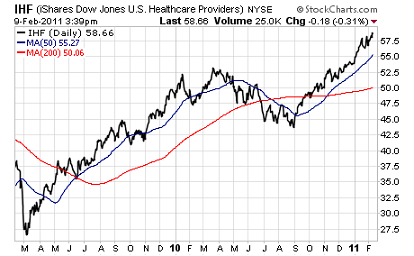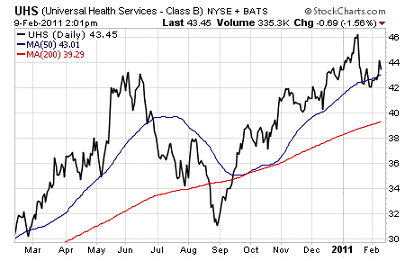The health care industry seems to have a better grasp of what President Obama's reforms mean for business. Now executives can calculate their next steps, and investors are pushing up prices for shares of health care related stocks.
For income investors seeking dividends, health care stocks are often attractive because of decent yields - but also because they are resilient in flat, or downward trending, markets. Health care is typically a defensive sector, and if stock prices do fall higher yields usually mean shares get snapped up quickly - thus putting a higher floor under the stocks.
Based on the performance of the iShares Healthcare Providers ETF (NYSE: IHF) however, the story is all about higher stock prices, not lower ones. The ETF is already up 9.2 percent after just a month and a half in 2011 after rising by 8.7 percent in all of 2010.
With a dividend yield of 6.2 percent this ETF is an attractive option for income investors interested in a defensive play.

 Dig
into the ETF a bit however and you'll find a number of small cap stocks
paying attractive dividends as well. The attraction strengthens when you
consider that this sector has seen several acquisitions recently.
Dig
into the ETF a bit however and you'll find a number of small cap stocks
paying attractive dividends as well. The attraction strengthens when you
consider that this sector has seen several acquisitions recently.
Already in February, we've seen two substantial deals: Dialysis-service provider DaVita DVA said it would pay $690 million for privately held DSI Renal to expand its presence. And Kindred Healthcare KND created the largest network of U.S. rehabilitation facilities by buying Rehabcare Group (NYSE: RHB) for $900 million.
Universal Health Services (NYSE: UHS)is an attractive health care stock that is worth a look. The stock makes up 1.9 percent of IHF's net assets, and pays a small dividend yielding 0.5 percent.
That yield is far below the 9 percent yield that some specialty companies are paying right now.
But capital gains potential is still significant with Universal Health Services. The stock rose 52 percent over the past year.

 ***Investing
in the health care sector really comes down to demographic trends. Baby
Boomers are turning 65, and an aging populace has a need for greater
health care services. In the U.S. in 2010, about 10 percent of the
population was 65 years old or older. This will nearly double by
2030.
***Investing
in the health care sector really comes down to demographic trends. Baby
Boomers are turning 65, and an aging populace has a need for greater
health care services. In the U.S. in 2010, about 10 percent of the
population was 65 years old or older. This will nearly double by
2030.
Universal Health Services operates acute-care and behavioral-health facilities. The company's goal is to lead in markets that are growing faster than the U.S. population as a whole. Nearly all of the UHS acute-care hospitals rank first or second in their markets.
The company is the dominant player in Las Vegas and South Texas, areas hard hit by the recession. UHS draws 24 percent of net revenue from Nevada, another 20 percent from Texas and about 10 percent from both California and Florida.
The company also completed the acquisition of Psychiatric Solutions in November. The deal brought together 25 acute-care hospitals and 102 behavioral health-care facilities (owned by UHS) and the 94 free-standing psychiatric inpatient facilities owned by Psychiatric Solutions.
Universal Health Services had 2009 net revenue of $5.2 billion, about a quarter coming from behavioral health, and the rest from acute care.
The behavioral business has "...weathered the recession quite nicely," stated CFO Steve G. Filton at the UBS Global Healthcare Services Conference on February 8. He also commented that there are signs that acute care is coming back.
For 2009, earnings per diluted share increased 28 percent to $2.49. Analysts surveyed by Thomson Reuters expect the company to post $2.56 in earnings per diluted share on February 28, when it reports its 2010 results -- a small 3 percent increase as it absorbs its large acquisition.
After a year of essentially flat earnings in 2010 (the company is expected to have earned $2.56 per diluted share) analysts are now predicting a substantial 38 percent increase in earnings per share for 2011, to $3.53.
With a forward P/E of 12, Universal Health Services is a value play among the health-care providers. And investors that get in early should be looking for that dividend yield to increase as the company grows earnings in the future.
For investors interested in additional income ideas, I recently published aspecial report featuring a unique company paying a dividend greater than 7.8 percent. Get the details here.
© 2024 Benzinga.com. Benzinga does not provide investment advice. All rights reserved.
Comments
Trade confidently with insights and alerts from analyst ratings, free reports and breaking news that affects the stocks you care about.